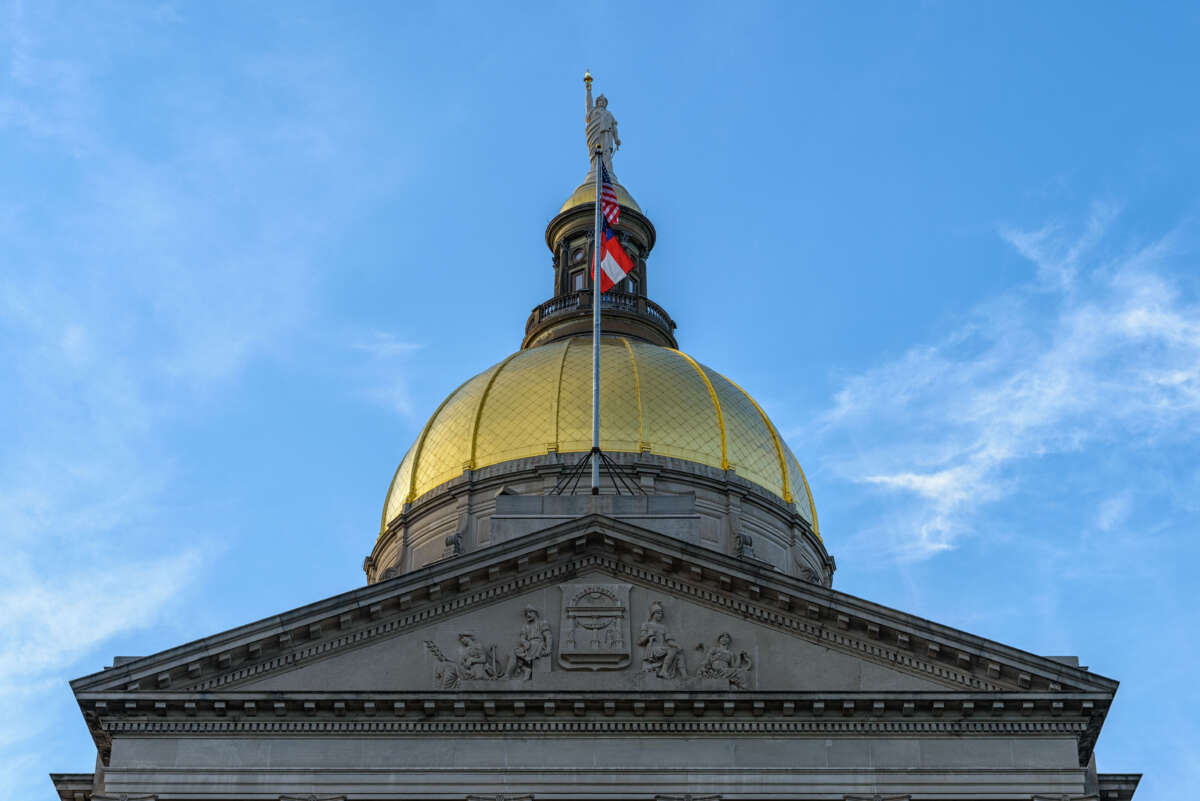Did you know that Truthout is a nonprofit and independently funded by readers like you? If you value what we do, please support our work with a donation.
Right-wing lawmakers in Georgia are advancing two bills that would erode free speech and protest rights in the state. HB 30 would categorize criticism of Israel as antisemitic hate speech and SB 359 would significantly expand the state’s Racketeer Influenced and Corrupt Organizations (RICO) law, enhancing sentencing based on “political beliefs.”
“Don’t sleep on this red clay fascism y’all,” political theorist Andrew J. Douglas said on social media.
In 2023, lawmakers in Georgia introduced a similar bill aimed at defining anti-Zionism as antisemitism but it failed to pass due to a dispute over wording. Nevertheless, the 2024 iteration of the bill — which was introduced in response to protests across the country for an Israeli ceasefire in reaction to Israel’s genocidal attacks in Gaza — has garnered unanimous support in committee and is now halfway through the legislative process on its path to becoming law.
Palestinian and free speech advocates say that such laws are attempts to block criticism of Israeli war crimes in Gaza.
“In the name of advocating against antisemitism, HB 30 manipulates the definition of antisemitism in ways that violate the First Amendment right to free speech and silences critiques of Israel’s human rights violations,” a coalition of civil rights advocates said in a statement. “The language in this bill is vague and opens the door for Georgians to be found in violation of agency regulations or to be prosecuted for voicing their opinions on Israel’s human rights violations and the genocide of Palestinians in Gaza even when a hateful act is not committed.”
Georgia is one of at least eight states across the country that have passed — or are considering passing — legislation that would define antisemitism within state law. Arkansas passed such a law in 2023, and similar bills are pending in Florida, Indiana, Massachusetts, New Jersey, South Carolina and South Dakota. In December, the U.S. House also passed a resolution condemning antisemitism, which critics say was so broad that it would define criticism of the Israeli government or its politics as antisemitism.
Proposed definitions of antisemitism have often hinged on guidance from the International Holocaust Remembrance Alliance (IHRA) and the increasingly right-wing Anti-Defamation League (ADL), which are pushing the idea that a “new” form of antisemitism has emerged that “manifests as opposition to Zionism and criticism of the Israeli state,” Wendy Elisheva Somerson, one of the founders of the Seattle chapter of Jewish Voice for Peace, wrote for Truthout in July.
Right-wing lawmakers in Georgia are also targeting protest speech, most likely in response to country-wide actions in support of Palestinian liberation by Students for Justice in Palestine (SJP) and Jewish Voice for Peace, in tandem with the “Stop Cop City” protests in Atlanta.
SB 359 would amend the state’s RICO Act to include placing posters and signs in unpermitted places and “loitering.” The bill would also allow “political affiliation or belief” to be a consideration in imposing heightened penalties.
RICO laws were initially conceived to fight organized crime. “RICO is meant to be a narrow criminal statute to address a very specific form of conduct where the puppeteer escapes culpability while the puppets continue to cause serious and often violent harm to the community over the course of years,” Lauren Regan, executive director of the Civil Liberties Defense Center, told The Intercept. “The proposed amendments to this statute circumvent that intent and are clearly meant to chill political organizing activities.”
In September, 61 people allegedly associated with the “Stop Cop City” movement were indicted under the state’s RICO law. Prosecutors alleged that activists who were protesting a $90 million police training facility under construction in Atlanta were engaged in a criminal conspiracy.
“We know these charges will not hold up in court, and we know that they are not intended to: The point is to shut down the social movement currently taking place in Atlanta, and to send a message that anyone advocating for social change could be a target,” the Atlanta Solidarity Fund said in a statement.
Prosecutors have also threatened Cop City activists with felony charges for placing fliers in mailboxes and police tear gassed activists in November for planting trees.
“Free speech is not free in this country and hasn’t been for quite some time,” criminal defense attorney Huma Yasin wrote for Truthout in June. “The most basic constitutional rights to speech, association and a free press are under a flagrant attack.”
Media that fights fascism
Truthout is funded almost entirely by readers — that’s why we can speak truth to power and cut against the mainstream narrative. But independent journalists at Truthout face mounting political repression under Trump.
We rely on your support to survive McCarthyist censorship. Please make a tax-deductible one-time or monthly donation.
